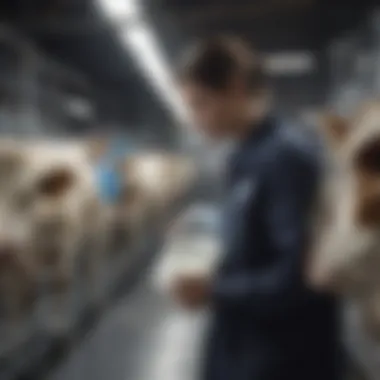Exploring Dairy Jobs: Opportunities and Insights


Intro
The dairy industry plays a significant role in agriculture, providing numerous employment opportunities. From farm management to research and development, the landscape is diverse. This article aims to unveil these opportunities and the associated skills, shedding light on trends that are shaping the dairy job market.
Understanding dairy jobs requires familiarity with various concepts and terms. Below, we will delve into key terminology and insights to help navigate this vital sector.
Understanding the Dairy Industry
The dairy industry is a crucial pillar within the agricultural sector. It plays a significant role in food production and economic stability. Understanding this sector is essential for individuals seeking dairy jobs. Knowledge of dairy farming, processing, and the overall industry landscape empowers potential employees to make informed career choices.
Overview of Dairy Farming
Dairy farming involves the management and care of dairy cows for milk production. It requires a blend of practical skills and knowledge about animal husbandry. Farmers focus on breeding, feeding, and milking cows while ensuring their health and welfare. The process includes maintaining sanitary conditions to produce high-quality milk. Modern dairy farms often employ technology-driven methods. For instance, automated milking systems help improve efficiency and animal comfort.
Dairy farming also necessitates an understanding of the market. Farmers must be aware of supply and demand trends. This knowledge can influence decisions like herd size or types of dairy products to produce. The increasing consumer preference for organic and local products further shapes dairy practices.
Significance of Dairy in Agriculture
Dairy farming significantly contributes to the agricultural economy. It provides employment for millions of people globally. Not only does it directly support dairy farmers, but it also creates jobs in processing, transportation, and retailing.
Moreover, dairy products are vital in many diets. Milk, cheese, and yogurt supply essential nutrients such as calcium and protein. The dairy industry is also linked with sustainability efforts. Farms are working towards lowering their environmental impact, employing strategies like better waste management and efficient land use.
In summary, understanding the dairy industry gives clarity about the job landscape in this field. It reveals the interconnections between farming, economy, nutrition, and sustainability, which are essential for anyone pursuing a career in dairy.
Types of Dairy Jobs
Understanding the various types of dairy jobs is essential for individuals seeking career opportunities in the dairy industry. Each role offers different responsibilities and requires specific skill sets. From farm management to specialized processing positions, the dairy sector presents a diverse range of job options. Recognizing these opportunities allows aspiring professionals to align their interests and qualifications with suitable roles, fostering both personal growth and industry advancement. Here, we discuss the primary categories of employment within dairy, emphasizing their significance in the broader agricultural landscape.
Farm Management Positions
Farm management positions are critical to the successful operation of dairy farms. These roles often involve overseeing daily operations, managing staff, and ensuring that production standards meet industry regulations. Effective farm management is essential for achieving high levels of productivity while maintaining animal welfare and environmental sustainability.
Key responsibilities include resource allocation, budgeting, and making strategic decisions to optimize farm output. A background in agricultural science or business management can be beneficial for individuals pursuing these positions. In addition, strong leadership skills and an understanding of the dairy industry are vital for success in farm management roles.
Animal Husbandry Roles
Animal husbandry roles focus on the care and management of dairy animals. Professionals in this field cultivate a deep understanding of animal health, nutrition, and breeding practices. Animal husbandry specialists work to enhance milk production and ensure the wellbeing of cattle.
These positions may include cow handlers, veterinarians, and nutritionists. Each role contributes significantly to maintaining herd health and ensuring high-quality milk. Training in veterinary science or animal science is often necessary, along with relevant experience in handling livestock.
Dairy Processing Careers
Dairy processing careers revolve around the transformation of raw milk into products like cheese, yogurt, and butter. These roles include quality control technicians, production supervisors, and process engineers. Professionals in dairy processing ensure that products meet safety and quality standards.
A background in food science or engineering can be advantageous in this sector. Understanding the regulatory landscape and having strong analytical skills are also key for those pursuing careers in dairy processing.
Research and Development Opportunities


Research and development opportunities in the dairy sector involve innovation and improvement of dairy products and farming practices. These roles may encompass product development researchers, agricultural scientists, and sustainability experts. Professionals are tasked with improving efficiency, enhancing product quality, and exploring sustainable practices in dairy farming.
A strong background in agricultural research, food science, or environmental studies can lead to success in these roles. Creativity and analytical thinking are critical attributes for individuals navigating this dynamic area.
Sales and Marketing Roles in Dairy
Sales and marketing roles are essential for promoting dairy products and building brand recognition. Professionals in this category work to understand market trends, develop marketing strategies, and establish customer relationships. Positions may include sales representatives, marketing managers, and brand coordinators.
Knowledge of the dairy market and effective communication skills are important for these roles. A background in marketing or business, combined with a familiarity with dairy products, enhances one’s ability to excel in this area.
"The diversity of roles within the dairy industry ensures ample opportunities for those looking to enter the field. Whether it is managing a farm or innovating new products, there is a path for everyone."
Understanding the types of dairy jobs available reminds potential candidates of the industry’s multi-faceted nature. Each position contributes uniquely to the overall functionality of the dairy sector, transforming interest in agriculture into rewarding career paths.
Skills Required for Dairy Jobs
In the dairy industry, possessing the right skills is crucial for success. These skills not only help individuals perform their work effectively but also enable them to adapt to the evolving challenges within the sector. Understanding the specific skills that employers value in dairy jobs can lead to better job opportunities and career advancements.
Technical Skills
Technical skills are essential in the dairy sector. These can include:
- Equipment operation: Knowledge of how to operate and maintain machinery used in dairy farming is vital. Familiarity with milking machines, pasteurizers, and other specialized equipment can enhance efficiency.
- Animal care knowledge: Proficiency in animal husbandry practices is necessary. This includes understanding animal health, nutrition, and breeding methods to ensure the well-being of dairy livestock.
- Data management: Many dairy farms use software to track production, health, and financial information. Understanding how to navigate these programs can provide a distinct advantage.
Employers often look for candidates who can utilize technology to increase productivity. Mastering these technical skills not only increases one’s employability but also prepares individuals for the industry's future trends that emphasize efficiency and innovation.
Soft Skills
In addition to technical prowess, soft skills play a significant role in dairy jobs. These skills include:
- Communication: The ability to communicate effectively with team members, supervisors, and clients is crucial. Clear communication fosters a productive work environment.
- Teamwork: Most dairy operations involve working as part of a team. Collaboration is essential for achieving common goals and ensuring operational success.
- Problem-solving: The dairy industry can present unexpected challenges, from equipment failures to health issues in livestock. Strong problem-solving skills are necessary to address and resolve these situations promptly.
Soft skills enhance an individual's ability to navigate workplace dynamics and contribute positively to team performance. As such, they are just as important as technical skills in ensuring success within the dairy industry.
"In a rapidly changing industry like dairy, the blend of technical and soft skills can significantly differentiate a good employee from a great one."
By developing both technical and soft skills, individuals can position themselves favorably in the job market. This balanced skill set will be essential for navigating the complexities of the dairy sector, making it crucial for aspiring dairy professionals to invest time and effort in their personal and professional development.
Finding Dairy Jobs Near You
The landscape of dairy employment is multilayered. For many, the search for a fulfilling career in the dairy industry can feel daunting, especially when trying to locate opportunities that are geographically convenient. Understanding where to look is vital. Many factors contribute to the overall success of finding a job tailored to individual skills and interests. This section explores various approaches to finding dairy jobs near you, emphasizing specific methods, their benefits, and the nuances involved in each approach.
Utilizing Job Portals
Online job portals serve as a primary resource for candidates seeking dairy positions. Websites like Indeed, Glassdoor, and LinkedIn aggregate job listings from a wide range of sources. Here are some points to consider when using these platforms:
- Broad Selection: You can access numerous job listings from different companies and locations, giving you a wider net to fish for opportunities.
- Filter Options: Use specific search filters to narrow down your results. You can filter by job type, location, salary range, and more.
- Alerts and Notifications: Most portals allow you to set alerts for new job postings that match your criteria. This ensures you will not miss any updates.
Besides traditional job portals, industry-specific sites such as DairyCareers.com and AgCareers.com may offer focused listings catering specifically to the dairy sector. This targeted approach could yield more relevant results.


Networking within the Industry
Networking is a crucial strategy for finding employment in the dairy industry. It can often uncover opportunities that are not advertised publicly. Here are some suggestions for effective networking:
- Attend Industry Events: Conferences, trade shows, and local meet-ups offer excellent platforms to connect with professionals in the field. Meeting individuals face-to-face can facilitate meaningful dialogue about potential job openings.
- Join Professional Associations: Organizations like the Dairy Farmers of America or the National Milk Producers Federation often provide resources for job seekers. Becoming a member can afford you access to job boards and networking events.
- Utilize Social Media: Platforms like Facebook, Reddit, and LinkedIn can facilitate connections within the dairy community. Engaging in groups focused on agriculture can provide valuable insights and job leads.
"Networking is not just about finding job leads. It's about building professional relationships that can last a lifetime."
Local Agricultural Colleges and Programs
Many local agricultural colleges and programs serve as key resources for finding dairy jobs. These institutions frequently collaborate with industry partners to connect students with employment opportunities. Factors to consider include:
- Career Services: Most colleges offer career services for students and alumni. These services often include job boards, resume assistance, and interview preparation.
- Internships and Practicums: Participating in internships can provide hands-on experience while simultaneously building a professional network. Many dairy farms and processing plants look favorably on candidates who have interned through educational programs.
- Continuing Education: Many agricultural colleges offer workshops and courses that can enhance your qualifications. This may improve your employability and diverge your career trajectory.
Overall, the process of finding dairy jobs near you can be significantly simplified by leveraging these strategies. A focused approach to utilizing job portals, engaging in networking, and tapping into local educational resources can create a more robust pathway to achieving your career goals in the dairy industry.
Job Trends in the Dairy Sector
Understanding job trends in the dairy sector is essential for anyone looking to build a career in this vital industry. As agriculture continues to evolve, the dairy sector must adapt to new challenges and opportunities. This section discusses the influence of technological advancements and sustainability practices on employment prospects in dairy farming, equipping readers with a clearer sense of future opportunities.
Impact of Technology
Technology plays a crucial role in shaping the dairy industry. Automation is becoming more common on farms. Milking robots, for instance, are a growing trend. These machines optimize milking processes, leading to increased efficiency and productivity. As a result, dairy farms can produce more milk while reducing labor costs.
Additionally, precision agriculture tools are gaining traction. Technologies such as GPS and sensors help farmers monitor cattle health and pasture conditions. This data-driven approach provides farmers insights that enable better management decisions. Such advancements create new job roles that require technical knowledge. Workers must understand how to operate and maintain these technologies.
In particular, technicians who can service and troubleshoot equipment are in demand. Understanding software systems for managing dairy operations is also vital. Overall, technology not only increases production capacity but also diversifies the skill requirements within the field.
Sustainability in Dairy Farming
Sustainability is becoming a prominent focus for the dairy sector. Farmers are increasingly aware of the environmental impacts of their practices. As consumers demand responsibly sourced products, many are shifting towards sustainable methods. This shift is driving the industry to adopt more eco-friendly practices.
Sustainable dairy farming includes several initiatives. Grass-fed practices promote healthier animals and reduce carbon footprints. Water conservation techniques are also essential. Recycling water and using efficient irrigation can greatly decrease water usage in dairy operations. As these practices grow, the demand for specialized knowledge in sustainable agriculture increases.
Training in environmental management and sustainable practices is a valuable asset for job seekers. Employers favor workers who understand these principles. In the long run, sustainability efforts may enhance job security as businesses strive to align with consumer expectations and regulatory requirements.
"The ability to adapt to new agricultural trends can significantly impact your career in the dairy industry. Understanding technology and sustainability will boost your employability."
In summary, as the dairy sector evolves, job seekers must stay informed about technological advancements and sustainability practices. Adaptability will be key to finding and securing positions in this dynamic field.
Employer Expectations in Dairy Jobs
Understanding employer expectations in the dairy industry is vital for anyone seeking a career in this field. These expectations can greatly influence job performance and career advancement. Employers look for more than just technical skills; they seek individuals who embody a strong work ethic, accountability, and an ability to adapt to changing conditions in a dynamic environment. Fulfilling these expectations not only enhances individual job prospects but also contributes to the success and growth of the overall dairy operation.
Work Ethic and Responsibility
A strong work ethic is a foundational quality that many dairy employers prioritize. This involves being dependable, diligent, and committed to tasks, no matter how small they may appear. Employees are often expected to work long hours, and sometimes in challenging conditions. This makes it crucial for workers to show up on time, adhere to schedules, and be proactive in their roles.
- Dependability: Workers must be reliable. Having others know they can count on you is essential. Instances of absenteeism can disrupt farm operations.
- Commitment to Quality: Producing high-quality products is paramount in the dairy industry. Workers should take pride in their work. This includes following safety protocols and maintaining cleanliness to ensure product safety and quality.
- Team Collaboration: Dairy farms often have a team-based approach. Employees need to communicate effectively and work harmoniously with others, sharing responsibilities and helping each other succeed.


These are just some ways through which a solid work ethic translates into responsibility and reliability, thus aligning with what employers seek.
Adaptability and Continuous Learning
Another key expectation is adaptability. The dairy industry is not static; it constantly evolves with advancements in technology, regulations, and market demands. Employers value workers who are open to change and willing to learn new skills.
- Willingness to Learn: As technologies such as automated milking systems and precision farming emerge, being open to new ideas and methods is crucial. Employees should stay informed about innovations and be ready to adapt processes to boost efficiency.
- Problem-Solving Skills: In dealing with livestock, machinery, and environmental factors, workers will inevitably face challenges. Employers appreciate employees who can think critically and propose solutions to issues as they arise.
- Flexibility in Duties: Different situations may require employees to take on varied tasks outside their usual roles. This flexibility can make a worker invaluable to an employer.
In short, adaptability supports ongoing growth not just for individuals but also for the dairy industry as a whole. Much like honing a craft, continuous learning leads to improved practices and sustainability.
"Employees who embrace adaptability help create a resilient workforce capable of meeting the industry's evolving demands."
By embracing these qualities, individuals can position themselves as desirable candidates in a competitive field.
Salary Expectations and Benefits
Understanding salary expectations and benefits is crucial for anyone considering a career in the dairy industry. It helps candidates make informed decisions about job offers and career trajectories. In addition to salary, benefits can substantially affect total compensation and job satisfaction. For aspiring professionals, knowing what to expect can guide them toward positions that align with their financial and personal needs.
Average Salary Ranges
Salaries in the dairy sector can vary significantly based on factors like job role, location, and level of experience. Generally, entry-level positions, such as farm workers or assistants, may start at minimum wage or slightly above. In contrast, experienced positions, such as dairy managers or veterinary specialists, can offer salaries exceeding $70,000 annually.
Here are some average salary ranges for various roles:
- Farm Workers: $25,000 - $35,000 annually
- Animal Husbandry Technicians: $30,000 - $45,000 annually
- Dairy Plant Managers: $60,000 - $80,000 annually
- Sales Representatives in Dairy: $40,000 - $65,000 annually
- Research Scientists: $50,000 - $90,000 annually
The salaries might be higher depending on the specific geographic area. Areas with a higher cost of living typically see higher wages to match that cost.
Benefits in Dairy Employment
Benefits can impact how attractive a job proposal is. Many dairy employers offer various benefits. These benefits often extend beyond salary.
- Health Insurance: Comprehensive health plans which can cover medical and dental needs.
- Retirement Plans: Employers may offer 401(k) plans with matching contributions to help employees save for retirement.
- Paid Time Off: Vacation days, sick leave, and holidays contribute to better work-life balance.
- Training and Development: Many employers offer opportunities for professional development to enhance employees’ skills.
- Employee Discounts: Some companies provide discounts on dairy products or related goods.
"A competitive salary paired with strong benefits makes dairy jobs appealing to many looking for stability in their career."
Understanding both salary expectations and benefits can help candidates evaluate their options in the dairy industry more effectively. This knowledge fosters more strategic career planning and strengthens negotiation positions during job offers.
Career Advancement Opportunities
Career advancement in the dairy industry can significantly impact one's professional journey. It is essential to understand the various pathways available for growth and how they can influence both job satisfaction and earning potential. Advancing in this sector often involves continuous learning, networking, and hands-on experience. Here, we explore specific elements that contribute to career advancement opportunities in dairy jobs, focusing on further education, professional certifications, and the value of industry associations.
Further Education and Certifications
Pursuing further education and certifications can greatly enhance an individual’s skills and credibility within the dairy sector. Formal education, such as degrees in animal science, agricultural management, or food science, provides theoretical knowledge and practical applications. Various vocational and technical colleges offer programs specifically tailored to dairy management and production, equipping graduates with essential skills relevant to current job demands.
Certifications, like Certified Dairy Manager from the American Dairy Science Association, can also provide a competitive edge. Completing specialized training programs often leads to a deeper understanding of industry standards, animal welfare, and sustainable practices, all of which are critical in contemporary dairy farming. Not only do these qualifications bolster resumes, but they also pave pathways to leadership roles in farm management or dairy processing.
Professional Associations and Organizations
Engaging with professional associations and organizations is a crucial aspect of career development in the dairy field. Memberships in groups such as the National Milk Producers Federation or the International Dairy Foods Association can offer numerous benefits. These associations provide access to industry reports, networking events, and exclusive workshops that promote professional growth.
Through these connections, individuals can learn about job openings, mentorship opportunities, and best practices that are essential for success. Additionally, participating in conferences and seminars organized by these organizations allows members to stay updated on the latest trends, technologies, and policies affecting the dairy industry. Building relationships with peers and experts enhances the visibility and support necessary for navigating one’s career path effectively.
"Networking within professional circles opens doors to opportunities that otherwise may not be visible. It is crucial in emerging fields like dairy where innovation is constant."















